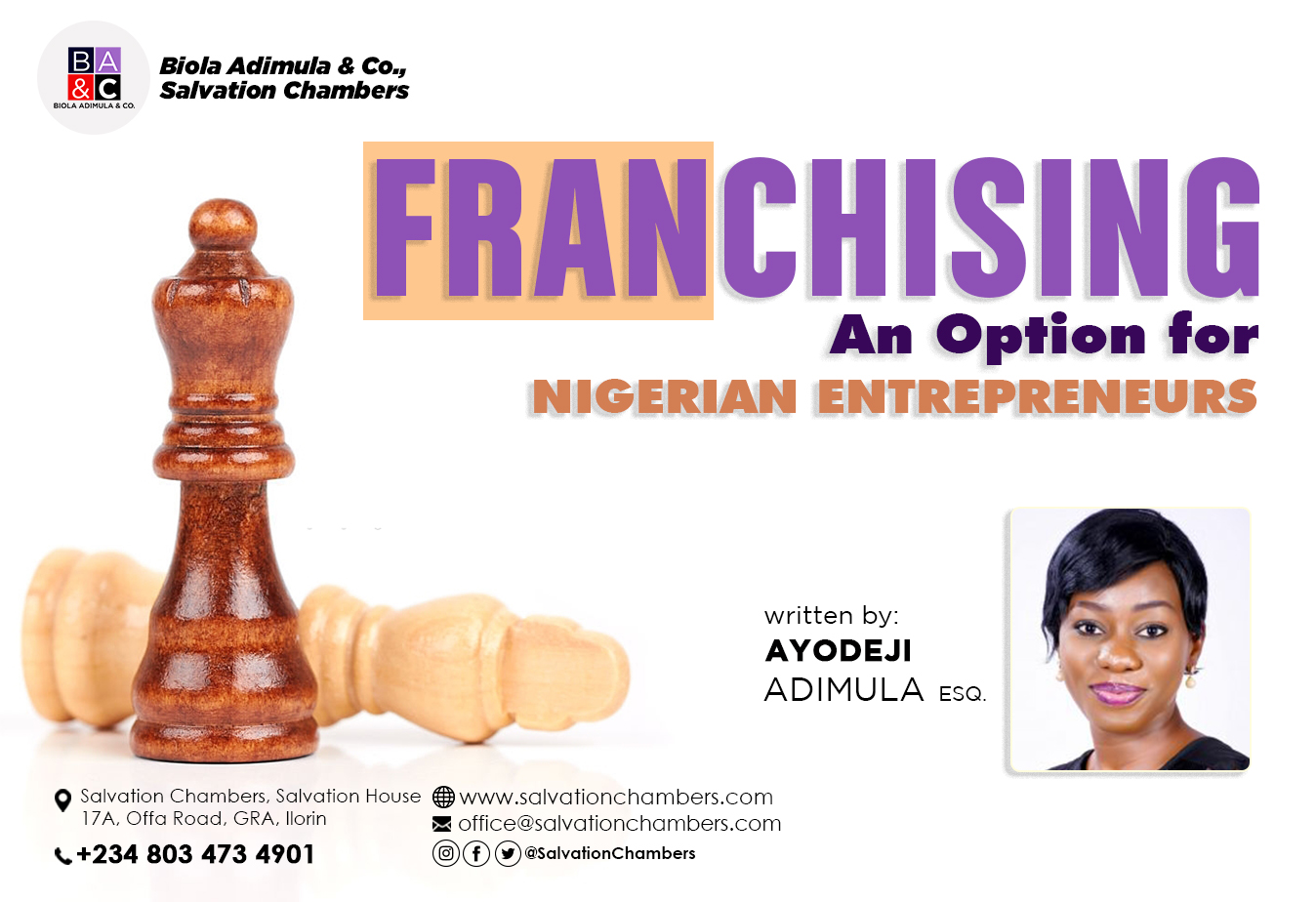Franchising allows an owner of a copyright or trademark (the franchisor) to transfer his rights to another (the franchisee); licensing and authorizing the franchisee to use the franchisor’s business name, idea, goodwill, brand, logo, model and market strategy in doing business in exchange for royalties.
In recent times, Nigeria has maintained an increasing economic growth rate with topmost ranking as Africa’s largest economy. This ranking is attributed to the large population/consumer market, diversity in human and natural resources, foreign direct investment, introduction of the Nigeria Industrial Revolution Plan (NIRP); also empowerment of SMEs by the government, amongst other factors have encouraged the proliferation of start-ups in Nigeria, thus making the Nigerian market attractive for doing business.
In setting up a business, small and medium-sized enterprises are particularly urged to conjecture the cons of the business environment such as high competition, tax payment, managing, branding, etc. associated with start-ups.
Against the backdrop of the foregoing, the option of operating a franchise becomes suitable for an entrepreneur who intends to penetrate and thrive in the Nigerian business market. A franchisor may adopt any of the three models of franchising:
- Product Distribution Franchise
Here, the franchisee would sell the product of the franchisor, usually on an exclusive basis
- Business Format Franchise
Here, the intellectual rights of the franchisor are used by the franchisee in doing business and the franchisee enjoys direct tutoring from the experienced franchisor. This is a more stringent structure as the franchisor is greatly involved in the modus operandi of the business.
- Manufacturing Franchise
Here, the franchisee is allowed to create and sell the same products as the franchisor.
In Nigeria, franchising has helped entrepreneurs to penetrate the business market and expand their customer base. For instance, brands such as House of Tara, Studio24, Chicken Republic, KFC, MAC, etc have successfully franchised their businesses and announced presence in their respective sectors; consequently impacting the economy positively through creation of employment opportunities.
Factors to Consider in Choosing a Brand
In choosing a brand to franchise, it is important to consider the following:
- Location
Consider the viability of the business in the area of choice. For instance, setting up a food franchise in a residential area may not be an excellent idea as opposed to setting same up in a business or commercial area.
- Cost & Royalties
Buying a franchise involves paying royalties in exchange for the license to use the intellectual property rights of the franchisor; thus balancing out the prospective profits and losses of the business is very crucial before deciding to buy a franchise.
- Knowledge of the Industry, Franchisor and Franchisee
Before buying a franchise, an entrepreneur should make his findings about the business, the franchisor and the franchisee. He must inquire as to how their first franchisees have been treated to know if the business is a suitable one. Likewise, other franchisees should be contacted for advice on the realities of the business.
- Success/Integrity of the Brand
Since the aim of buying the franchise is to expand the business of the franchisor, a franchisee must look out for businesses which have been successful in building their brand and franchising their business.
- Analysis of Market Opportunity
A franchisee should find out if there is high demand for the product or service to be offered. An entrepreneur should carefully consider what model of franchising fits his personality and intentions before buying a franchise.
- Control & Marketing Initiatives
In deciding to buy a brand, a franchisee who intends to be creative and explore his initiative in the business must consider if he is able to accommodate the extent of control the franchisor offers.
Contractual Structure
Before franchising, the franchisor discloses material information about the franchise and responsibilities of both parties to the franchisee through a Franchise Disclosure Document (FDD). Thereupon, the parties enter into a Franchising Agreement, a legal document which stipulates the modus operandi of the business, the rights, liabilities and obligations of the parties.
Legal Framework
Although there is no single regulatory legislation governing franchise in Nigeria, franchising is regulated by general contract law and other relevant legislations. Particularly, its contractual and commercial nature attracts specific legislations such as The National Office for Technology Acquisition and Promotion Act (NOTAP Act), The Companies and Allied Matters Act, The Trademark Act, The Copyright Act, for its regulation.
The Immigration Act mandates a foreign franchisor to obtain a business permit before engaging in any business or trade in Nigeria. The business permit is obtainable on application to the ministry of internal affairs. Through this business permit, a franchisee permanent authorization for the local operation of businesses with foreign investments either as branch/subsidiary of a foreign company or otherwise.
Also, The Miscellaneous Offence Act prohibits the importation, sale or purchase of goods that are prohibited under the Nigerian law. Thus a franchising agreement will be criminal if it deals with the commerce of goods that are banned in Nigeria.
Settlement of Disputes
In the event of a dispute, parties may agree to settle through alternative dispute resolution mechanisms in their franchise agreement. They may otherwise commence a proceeding in the court based on a proper application of either party.
by Ayodeji Adimula (Esq.)

